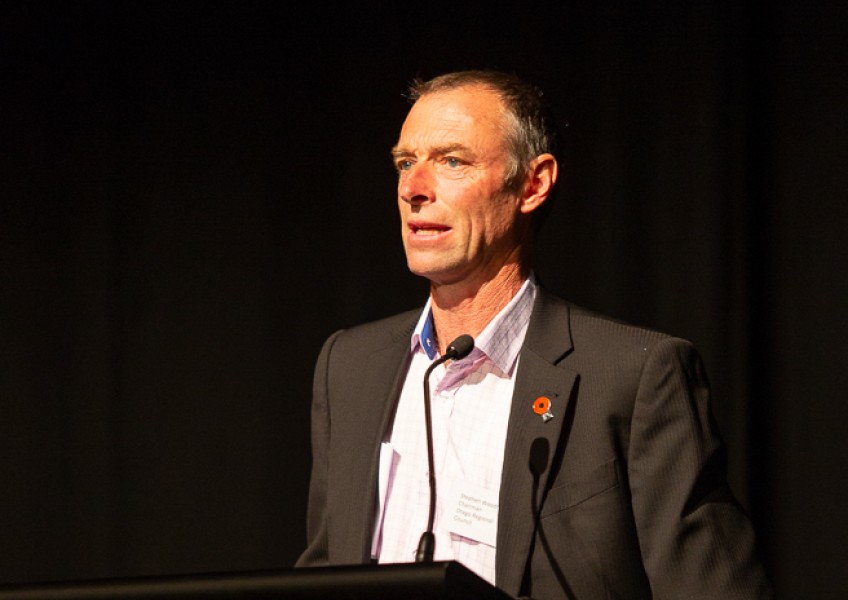Crux Water Forum - New responses from Otago Regional Council

We promised that written questions at the Crux Water Forum would get answered after the event if there was not time for the panel to respond on the night.
Thank you Otago Regional Council for these responses - we've sent a gentle reminder to the Queenstown Lakes District Council and Dr Mike Joy for their additional input.
Question:
Is Mr Woodhead willing to address the over allocation of streams for irrigation? Given a close correlation between water quality and water quantity?
ORC Answer:
There are a number of ways we address over-allocation. Sometimes there will be a transition, which means it may take some years to change. In many of our rivers we have minimum flows set to protect the ecology of the waterway; where we do not have a minimum flow in place we are moving to put them in place. The other method we use to protect the ecology of the waterway is to set a residual flow as a consent condition; this stipulates the amount of water that must be left in the river after water has been taken out of it.
Some deemed permits are over-allocated on paper, and the amount allocated is considerably more than what is actually used. This is a historic issue from gold-mining days and is addressed when permits are converted to consents. There is a deadline of 2021 for all deemed permit holders to get them replaced with a resource consent.
In addition to this, Council has made a resolution to undertake a full Water Plan review, and this process has already started.
Question:
Is it good environmental policy to divert water from the Arrow River to dilute contamination in another catchment - Lake Hayes. This is dilution of pollution without full consideration of effects on the Arrow River?
ORC Answer:
The diversion of water from the Arrow River is only one option of many for the restoration of Lake Hayes. Public consultation on the remediation options will occur later this year.

Question:
If Lake Hawea is best river quality in the country, what causes toxic algae in the Hawea river? There are signs stating this algae is fatal to dogs?
ORC Answer:
Phormidium is a type of cyanobacteria (algae) that’s widespread throughout New Zealand, including those with very good water quality (like the Hawea River). The algae is capable of producing cyanotoxins which can be toxic to dogs, livestock and people.
The algae mats can come loose and settle on riverbanks and shallow areas where animals are more likely to consume it. Dogs are attracted to its musty smell, it can be fatal to them if eaten. You can find out more here: https://www.orc.govt.nz/managing-our-environment/biodiversity-and-pest-control/pest-control/toxic-algae
Question:
To Stephen and Jim Please inform us of 3 practical steps in … /ongoing changes for your respective regional and district plans that will ensure better fresh water quality?
ORC Answer:
1. Following the approval of our urban water quality strategy, we are working with the District/City councils to develop plans for the improvement of storm water management.
2. The ongoing implementation of our rural water quality work. We work closely with rural Otago to implement our Good Water programme.
3. The lift in education activities and partnering with catchment/ community groups.
4. We have increased the number of our State of Environment monitoring sites across Otago, and are also installing monitoring buoys in some of our lakes.
5. We are undertaking a full Water Plan review, and this process has already started
Question:
Have the interested constituents looked at successful collaborations elsewhere in the world? I could point to one I am familiar with in Washington State (US). This has a collaboration of government, Indian tribes, agriculture and environmental groups regarding the Yakima River conservation area?
ORC Answer:
The National Policy Statement for Freshwater Management (NPS-FM) requires councils to set objectives and limits for freshwater quality and quantity, and to ensure that land use and water are managed in an integrated way. It requires that iwi and hapū, stakeholders/community representatives be involved in freshwater management and their values are reflected in decisions about the management of fresh water.

Question:
For ORC - how has your water quality plan that has been in place since 2004 helped the water quality of Lake Hayes - known as one the three most polluted lakes in Otago?
ORC Answer:
The regional Water Plan details expectations of lake water quality, with a target date of 2025 to meet limits. It is known that Lake Hayes will not meet limits and a plan for remediation is in progress. The remediation options will be publicly consulted on later this year.
Question:
Where is Mr Woodhead's figures of 70 - 80% clean lakes come from in Otago? When ecolli is found in Wakatipu and Dunstan?
ORC Answer:
This information comes from the following publication: Ministry for the Environment (March 2018). Regional information for setting draft targets for swimmable lakes and rivers. Published by the Ministry for the Environment on behalf of a joint taskforce of central and local government representatives. This document states that overall, 79 per cent of rivers by length, and 97 per cent of lakes in the Otago region are swimmable. In the NPS-FM, the approach for measuring water quality for swimming is determined by E. coli concentrations in rivers and toxic algae biovolume in lakes (both modelled). ORC undertakes weekly contact recreation monitoring at various swimming spots during the summer. E.coli is a measure used to indicate health risk. High E.coli has been found in Lake Wakatipu, and the source has been identified as avian (birds/ducks etc)
Question:
Recent staff turnover at ORC mirrors reported competition for water management and scientific staff nationwide. How can ORC cope in the future with its water management responsibilities and what is the prospect for achieving sustainable levels of water quality management?
ORC Answer:
We’re going through an exercise of reviewing job descriptions and making sure they are all sized to ensure we are competitive with other councils around NZ. We use a number of strategies to attract staff, including promoting vacancies through employment agencies to get a wider reach, and also offering flexibility around where in the region people work. We also have access to skilled consultants to fill gaps if and where needed.
Successful water management is a whole of community challenge. ORC puts in place regional plans, and works with community and business to educate and drive behaviour change. We also monitor progress, however progress relies on everyone making changes to maintain or improve water quality. It is a challenge that will take time, but we are confident we can achieve our goals.
Question:
How is prioritisation of water allocation established?
ORC Answer:
The allocation of water under the Resource Management Act 1991 (RMA) is predicated on a first-come-first-served principle whereby applications to take water will be dealt with strictly in the order in which they arrive and will be considered against the objectives and policies set out in regional plans and other relevant planning documents.
However, water taking in many Central Otago catchments is not only authorised under resource consents granted under the RMA, but also under mining privileges. Mining privileges are licences issued under the Mining Act 1926, which entitled the holder to construct and maintain a race, or to use a natural channel as a race, on the land specified in the licence. The licence also entitled the holder to take a specified quantity of water for a variety of uses (e.g mining, domestic, irrigation). The date upon which the mining privilege was granted determined its order of priority in relation to other licences and mining rights. The holder of the earliest-dated, or highest priority licence could require the holders of all other licences to reduce or cease their taking of water until his licence was satisfied. Similarly, the holder of the second-priority licence could require everyone, except the holder of the first priority licence, to reduce or cease their taking of water until his licence was satisfied. And so on down through the priority ranking.
The priority system created by the mining privileges still exists today as the RMA allows holders of mining privileges and rights granted in substitution of a mining privilege, to exercise their water right until 1 October 2021, the date on which these licenses expire. Under the RMA these licence holders can apply for a replacement consent in respect of the activity to which this mining privilege applies.
Unlike mining privileges, RMA resource consents do not have a priority system for access to water. Hence the priority system is effectively coming to an end with the surrendering or expiry of the mining privileges and their replacement with RMA consents.

Question:
I'm concerned about the agricultural impact on our waterways. It's my understanding that it's illegal to have cattle and other animals in waterways such as the Dart River and Caples Valley Rivers but I have personally seen farm activity on all these valleys (and have photos) What is Council doing to enforce rules to prevent contamination?
ORC Answer:
In Otago, stock can have access to waterways so long as they do not damage the banks or bed of the waterway or degrade the quality of the water. This is most relevant for hill and high-country farming or where steep gullies limit access, and where the stock intensity rate is low.
Question:
Would you block a development consent based on the agreed upon urgency and importance of this issue - How is prioritisation of water allocation established?
ORC Answer:
We look at each and every consent application on its merits. When a consent application is received, we process them to ensure they meet all the legal requirements of the RMA, our Water Plan and other relevant planning documents.
Most development applications require agreement between ORC and the city/district council, and we work closely with them on applications.
With regard to privitisation of water, ORC is responsible for water allocation. This doesn’t stop irrigators forming their own companies to manage their consents.
Main Image: ORC Chairman Stephen Woodhead at the Crux Water Forum.

























